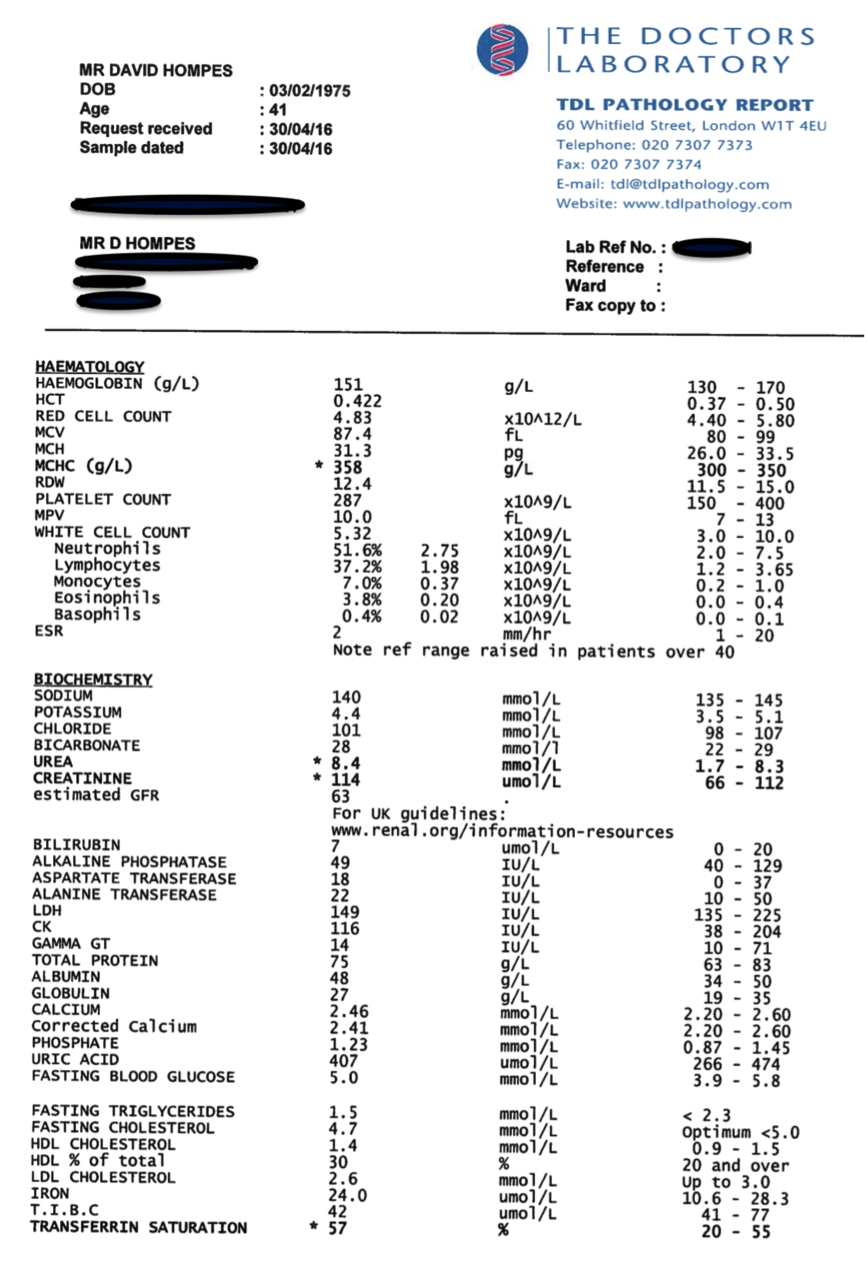The first major problem with blood testing – especially in the NHS here in Great Britain – is the enormous inconsistency in the specific markers that are tested.
When I began analyzing complete blood count/chemistry (CBC) tests I was astonished by the number of markers omitted in my clients’ tests, so much so that I wondered why the word ‘complete’ was used at all!
A standard CBC should include the following markers (as a minimum):
- Red blood cells, haemoglobin, haematocrit, MCV, MCH, MCHC, RDW.
- White blood cells, neutrophils, lymphocytes, monocytes, eosinophils, basophils, platelets.
A metabolic panel / blood chemistry should include the following:
- Blood sugar markers: Glucose, insulin, HbA1C
- Kidney markers: Uric acid, urea (BUN), creatinine, GFR
- Electrolyte balance: Sodium, potassium, chloride, carbon dioxide, calcium, phosphorus
- Liver/protein markers: Bilirubin, total protein, albumin, globulin, ALP, ALT, AST, GGT, LDH
- Iron panel: serum iron
Additional panels and markers…
A really, really good blood test will also include the following:
- Lipid panel: Total cholesterol, HDL and LDL cholesterol and triglycerides
- Thyroid panel: TSH, total T4, free T4, free T3, thyroid antibodies
- Complete iron panel: serum ferritin, TIBC, %transferrin saturation
- Inflammation markers: C reactive protein, ESR
This is not the time and place to explain what all these markers mean, and why they’re important.
Suffice to say that the fewer markers you receive, the less information is available about your metabolism.
Where the problems begin
The total number of markers listed above is 51, with the basic list totalling 37.
When I want to see a blood test result (which I do for all clients) I typically send a list of markers for my clients to request from their doctor.
In the U.S., I’ll often receive all these markers and sometimes more, which is great.
But it’s a different story in here in the U.K. where, disappointingly, it’s a bit of a lottery because some tests have markers missing, then other tests have other markers missing.
Sometimes, my clients have requests for certain markers turned down, point blank.
Take Sam, for example:
I sent a list of blood test markers to Sam, one of my clients.
Of the 48 markers I requested, Sam’s doctor ran 26, which is about 50% of what I wanted to see.
Nobody is to blame here, but Sam would be right to feel a little short-changed.
Omitting so many important test markers isn’t ideal because it may mean key information about Sam’s metabolism is missed.
Then, take Trevor:
Trevor has a holiday home in Turkey. I sent the same list of markers for him to have tested.
Trevor requested the test with his doctor in Turkey.
The following day he had the blood drawn, and his results were received 24 hours later.
Of the markers I requested, fully 40 were reported, 50% more markers than Sam received despite identical requests.
You might say that Sam only received half a test.
And finally my latest test result:
You can see my blood test result, below. It contains 46 different markers, which is the least I’d accept.
I paid privately for this test rather than trying to negotiate with my doctor as to what I could and couldn’t get my hands on!

As you can see, this is quite a comprehensive analysis, but it still doesn’t include certain markers that I’d like to see.
Notable omissions are ferritin, thyroid markers, C-reactive protein, vitamin D, folate, B12 (and more advanced markers such as copper, zinc and magnesium).
Summing up the first challenge with blood chemistry analysis:
I hope you can see how blood tests from clinic to clinic, and country to country, can vary.
If you’re in the UK, it’s important to realise that unless you’re ultra-careful, the NHS isn’t going to run the appropriate blood test markers for you.
There’s tremendous inconsistency in the blood test markers being analysed around the country.
The NHS is a magnificent institution that helps you deal with acute illness or accidents, but please please be aware of its shortcomings when it comes to basic blood testing and health screening.
In the next article we’ll explore the second main drawback of conventional blood testing, namely the insanity of ‘normal’ reference ranges that tell you you’re perfectly healthy even if you have 10-12 different symptoms.
Click here to skip through to the next article.
Best,
Dave.

Comments are closed.